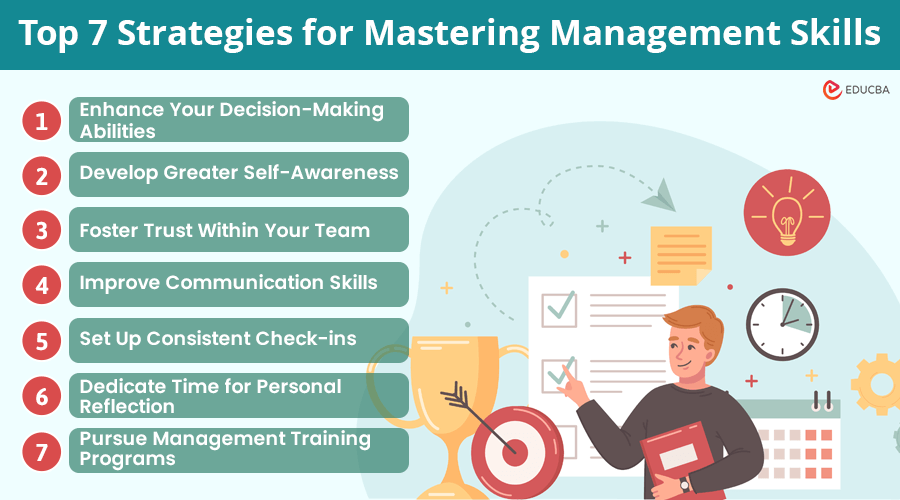
Strategies for Mastering Management Skills – Overview
Mastering management skills is crucial for anyone who wants to lead teams well and achieve organizational success. Whether you are a seasoned manager or just stepping into a leadership role, there is always room to improve and adapt to the dynamic business world. This article explores 7 key strategies for mastering management skills that can enhance your abilities, foster better relationships with your team, and help you navigate challenges confidently. These practical tips will help you become a skilled manager and an inspiring leader.
The Importance of Management Skills
Effective management skills are crucial in the competitive job market. Organizations seek individuals who can lead teams, make informed decisions, and guide projects to success amid constant change. Key management skills, such as communication, strategic thinking, and problem-solving, are vital for navigating complexities, fostering teamwork, and achieving organizational goals. Managers equipped with these skills are better prepared to handle disruptions, adapt quickly, and maintain productivity, making them valuable assets to employers.
Getting a Post Graduate Diploma in Management (PGDM Course) is a great way to develop these skills. PGDM programs are industry-focused, providing practical training that blends theory with real-world business scenarios. These programs cover various management topics, including finance, marketing, and organizational behavior, equipping students to tackle different business challenges.
Additionally, PGDM courses emphasize leadership development, teamwork, and strategic decision-making, providing learners with the tools needed to prosper as managers.
What Are Management Skills?
Management skills help individuals effectively plan, organize, lead, and control resources to achieve organizational goals. These skills are vital for ensuring smooth operations and successful outcomes in a professional environment. Core management skills include:
- Leadership: Motivating and guiding a team.
- Communication: Communicating ideas and fostering collaboration.
- Decision-Making: Selecting the best options to solve problems.
- Time Management: Prioritizing tasks effectively.
- Strategic Thinking: Setting long-term objectives.
- Conflict Resolution: Ensuring a positive work environment.
- Delegation: Distributing work to optimize productivity.
Continuous improvement of management skills leads to better performance, innovation, and team success.
7 Strategies for Mastering Management Skills
Here are 7 effective strategies for mastering management skills:
#1. Enhance Your Decision-Making Abilities
Strengthen your decision-making skills by analyzing data, weighing options, and considering potential outcomes. Practice making timely decisions under different scenarios to build confidence and clarity. Improving your decision-making process will better equip you to guide your team effectively and address challenges swiftly.
#2. Develop Greater Self-Awareness
Understanding your strengths, weaknesses, and emotional triggers is crucial for effective management. Self-awareness helps you adapt your leadership style to various situations. Regularly seek feedback and reflect on your actions to improve your interactions with your team and enhance your decision-making abilities.
#3. Foster Trust Within Your Team
Trust is essential for team cohesion and productivity. Build trust by being transparent, reliable, and empathetic. Recognize and appreciate your team’s contributions, listen actively, and maintain open communication. Trust fosters a motivated and collaborative work environment where team members feel valued.
#4. Improve Communication Skills
Effective communication is essential for successful management. Focus on actively listening, expressing your ideas clearly, and promoting two-way feedback. Modify your communication style based on the situation and the people you are addressing. Being clear and open reduces misunderstandings and helps build stronger relationships.
#5. Set Up Consistent Check-ins
Regular check-ins with team members promote a culture of support and accountability. Use these meetings to track progress, address challenges, and provide constructive feedback. Consistent communication ensures alignment with objectives and helps identify issues before escalating, improving performance and team cohesion.
#6. Dedicate Time for Personal Reflection
Set aside time to evaluate your actions, decisions, and outcomes. Reflection helps you identify what works and needs improvement, enhancing your ability to learn from experiences. It also enables you to adjust your management style and approach, fostering continuous growth and better leadership.
#7. Pursue Management Training Programs
Enroll in management training to build a solid foundation of skills and knowledge. Training programs offer tools, techniques, and insights into leadership best practices, enhancing your ability to navigate complex situations. A structured approach to developing effective strategies makes you a more skilled and confident manager.
Final Thoughts
Mastering management skills requires dedication, practice, and a proactive personal and professional growth approach. The strategies for mastering management skills outlined above provide a roadmap for enhancing essential managerial abilities, from decision-making to effective communication. A PGDM course can be instrumental in this journey, offering structured learning, industry insights, and practical exposure to management principles. By combining these strategies with formal education, such as a PGDM, aspiring managers can gain a competitive edge, develop a comprehensive understanding of business dynamics, and effectively lead teams toward organizational success. Empower your career with the right skills today.
Recommended Articles
We hope these strategies for mastering management skills inspire you to elevate your leadership abilities. Explore these recommended articles for more insights and techniques to enhance your management journey.

